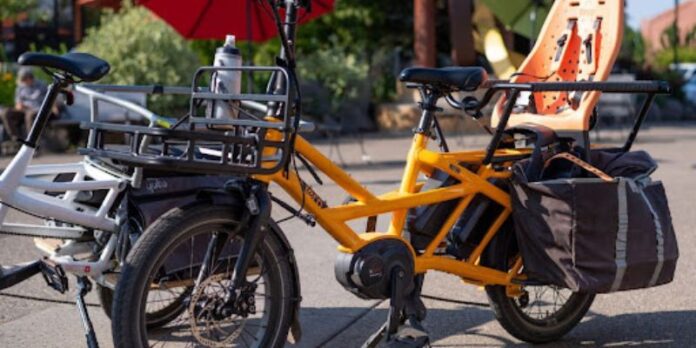This colloquially called electric cargo bike has grown to be one of the transformative answers for urban logistics and personal transport. Hundreds of cities worldwide are gazing with vigor at the possibility these innovative vehicles have for the future development of e-commerce, putting a growing emphasis on sustainability. This article puts various implementation case studies under review alongside the impacts electric cargo bikes pose, with the versatile cargo bike Infinity Cargo E-Bike particularly discussed, and Snapcycle Infinity Cargo E-Bike.
Amsterdam: Leading the Charge:
Amsterdam has always been ‘cycling-friendly’, and this city has taken to electric cargo bikes; these vehicles have fitted right into the transport ecosystem. More and more local companies are using cargo electric bikes for making deliveries, lessening the dependence on fossil fuel-powered transportation.
Other examples are local bakeries that started doing daily deliveries with the Infinity Cargo E-Bike. According to reviews, the bakery realized a considerable reduction in delivery costs because the electric cargo bike is cheaper to maintain and run than vans. Moreover, the traffic prowess of the bike around narrow streets and dedicated bike lanes increased the efficiency of delivering baked goods to customers.
The city has also provided cargo ebike charging stations at the workplace, encouraging businesses to use ebikes to travel without any hesitation. That infrastructure development has resulted in a notable reduction in traffic congestion in general and improved air quality, proving that electric cargo bikes really are a solution that works for urban logistics.
Paris: Redefining Urban Logistics:
Electric cargo bikes are rapidly changing last-mile delivery services in Paris. The initiative taken by the city for sustainable transportation called for businesses to make the shift to cargo e-bikes. A grocery delivery service is doing pretty well locally with Snapcycle Infinity Cargo E-Bikes.
Strongly increasing customer satisfaction can be attributed to the reliability and speed at which this service finishes its deliveries. Electric cargo bikes, while carrying larger loads, are agile enough to negotiate efficiently around busy Parisian streets. This route optimization, further enhanced by GPS and tracking on these e-bike cargo models, has contributed to shortening delivery times and raising the quality of the service even further.
It is therefore no surprise that the serious way in which the city has taken its commitment to reducing emissions has effectively translated into strong financial incentives for businesses to adopt electric cargo bikes. Companies are increasingly investing in these environmentally friendly vehicles, and all seems to be falling in place for Paris’ vision of a zero-emission city by 2030.
San Francisco: Embracing Innovation:
When it comes to San Francisco, specifically, the hilly landscape carries some particular challenges in delivering cargo. Great challenge, great opportunity: it has taken the electric cargo bike as a very practical answer to keep goods on the move. Indeed, local startups have begun the deployment of cargo bikes for hauling goods around, reducing the need for larger delivery trucks that struggle up steep hills.
The most interesting case is that of a startup that sells fresh farm produce to customers right at their doorsteps. With these electric cargo bikes, the company meets the exact demand of its customers organic, fresh produce being delivered on time and also minimizes carbon emissions. Especially in the tough landscape of San Francisco, the Infinity Cargo E-Bike has been of great use to make deliveries really fast and without the emissions from conventional vehicles.
In fact, city infrastructure has aligned with this change in the form of dedicated bike lanes and even cargo e-bike parking. Thus, other companies continue to recognize an opportunity in electric cargo bikes and foster the culture of sustainability and innovation in San Francisco.
Berlin: Model of Sustainability:
Berlin is also a pioneer in the use of electric cargo bikes. In this city, there is growth in either personal or commercial use of cargo electric bikes. An outstanding example is the way one logistics company has merged electric cargo bikes into its fleet to make deliveries across the city.
The company reported improved operational efficiency and reduced delivery times. The electric cargo bike means a quicker response to the customer order, mainly in densely populated areas which otherwise create a delay for traditional delivery vehicles. The cargo e-bikes quickly get through jams, hence reducing the congestion time.
The Berlin government actively supported the use of electric cargo bikes, with state subsidies to businesses investing in the technology. This measure rewards ‘greener’ behavior and supports the local economy in the creation of ecological logistics companies.
Conclusion:
These case studies of Amsterdam, Paris, San Francisco, and Berlin underpin the transformative potential of electric cargo bikes within urban settings. With cities facing congestion, pollution, and logistical efficiency, cargo e-bikes are a pragmatic answer with benefits for both businesses and the community.
Examples are the infinity cargo e-bike and Snapcycle Infinity Cargo E-Bike, which entirely represent a coming together of technology and innovation in the development of sustainable transport solutions. With increasing support from governments and businesses alike, it foretells a promising future of urban mobility and opens a way toward a cleaner, more efficient world courtesy of electric cargo bikes.
The cargo electric bike will be used more and more in the future as more cities feel the benefits of adopting the bikes and, finally, how we conceptualize urban transport and logistics changes.





